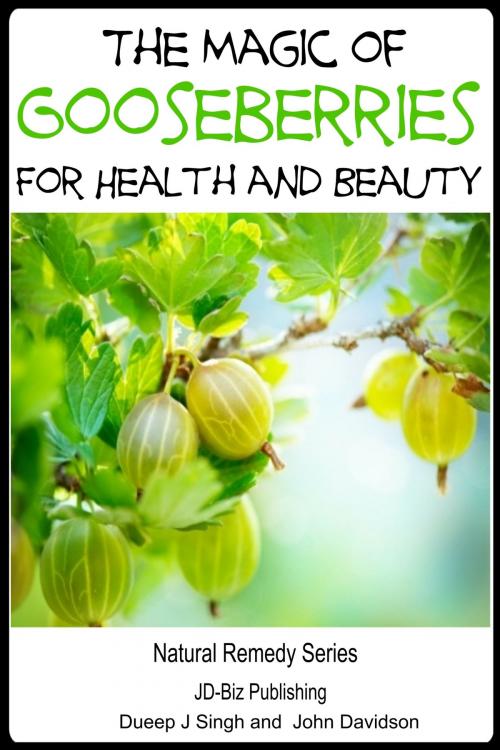The Magic of Gooseberries For Health and Beauty
Nonfiction, Health & Well Being, Health, Women&, Healthy Living| Author: | Dueep Jyot Singh, John Davidson | ISBN: | 9781310466175 |
| Publisher: | JD-Biz Corp Publishing | Publication: | February 26, 2014 |
| Imprint: | Smashwords Edition | Language: | English |
| Author: | Dueep Jyot Singh, John Davidson |
| ISBN: | 9781310466175 |
| Publisher: | JD-Biz Corp Publishing |
| Publication: | February 26, 2014 |
| Imprint: | Smashwords Edition |
| Language: | English |
The Magic of Gooseberries For Health and Beauty
Table of Contents
Introduction
How to Grow Gooseberries
Gooseberry Varieties
Planting a Single Shoot Gooseberry Tree
Gooseberry Diseases
Gooseberry Cuttings
Gooseberry Harvesting
Gooseberries for Health
Magic Chyavanprash
Chyavanprash Recipe:
Gulqand – Rose Jam – Recipe:
The Natural Cure For Sugar Diabetes
Gooseberry for Increasing Brainpower
Preventing Excessive Thirst and Prickly Heat
Getting Rid of Cough
Hoarse Throat
Curing Migraine
How Useful Is Gooseberry with Honey
Try This Tip
Preventing Vitamin C Deficiency
Liver Problems
Curing Jaundice
Gooseberries for Beauty
Suffering from Skin Ailments?
Making a Gooseberry Skincare Cream
Hair Loss Recipe
Natural Conditioners for the Hair:
Traditional Natural Shampoo
Best Natural Rinse after a Shampoo
How to make Rose water (Gulab Jal)
Natural Hair Dye
My Own Shampoo
Hair Darkener
How to Make Gooseberry Hair Oil
Taking Care of Your Teeth
Pyorreah
Shaking teeth
Gooseberries in Traditional Cooking
Gooseberry Chutney
Traditional Gooseberry jam
Traditional Gooseberry pickles
The Difference between Chutneys and Pickles
Conclusion
How to dry gooseberries?
Desi ghee
Author Bio
Introduction
Playing gooseberry may be an aphorism to describe an unwanted person, who is not needed in a self-contained and self absorbed group of two, but in reality, the common gooseberry is one of the most precious, wanted and valuable of natural plants.
Gooseberry shrubs can be found all over the world, where the climate has plenty of sun, and the humidity content in the air is high. Native American gooseberries are larger than their Asian counterparts.
Not only is this an excellent medicinal plant, but it is also well-known for its beautifying qualities. In fact, the ancient sages in the East. Make sure that they had plenty of gooseberries, in their daily diet, because they considered this fruit to be the reason for their longevity, everlasting good health, and youthful looks.
The ancients called this the gift of the gods, and thought that the gods had given the gooseberry to man because even though they could not give him immortality, they could give him longevity in the shape of gooseberries. That is because Indian myth says that this plant grew from a few drops of nectar, dropping on the earth by the gods taking the treasures of the sea, to the heavens. These treasures were obtained by churning the seas by the gods and the demons. Out of them, the nectar of immortality was one.
Gooseberries, also known as Emblica officianalis have long been a religious, and political symbol in India and China.This is the reason why, in ancient Indian history, myth and religious tradition, giving a gooseberry to somebody who you honored and revered was considered to be the prerogative of Kings. The Hindus worship the gooseberry tree, because they consider Lord Vishnu to live in this plant.
Living in South India as a child, I consider myself to have been brought upon gooseberries, because that was what we used to gnaw at school, and best friends used to share their “nellikas” among themselves. Hiding your own supply of gooseberries was considered the height of selfishness and treachery among friends. These gooseberries were of course “purloined” from the gooseberry trees, growing in particularly targeted gardens. It is a wonder how we managed to digest those raw gooseberries, along with raw guavas. And all of us had the lyrics of a very popular song of the time down pat, of which the chorus was – Nellikai amma illi baa [lit – gooseberry lady, come here…] We enjoyed the extremely sour taste of gooseberries, when we did not have tamarinds around. And that is why, whenever we had some time to spare, we would be hitting the branches of the deciduous gooseberry tree with a long stick in order to make the gooseberries fall.
The Magic of Gooseberries For Health and Beauty
Table of Contents
Introduction
How to Grow Gooseberries
Gooseberry Varieties
Planting a Single Shoot Gooseberry Tree
Gooseberry Diseases
Gooseberry Cuttings
Gooseberry Harvesting
Gooseberries for Health
Magic Chyavanprash
Chyavanprash Recipe:
Gulqand – Rose Jam – Recipe:
The Natural Cure For Sugar Diabetes
Gooseberry for Increasing Brainpower
Preventing Excessive Thirst and Prickly Heat
Getting Rid of Cough
Hoarse Throat
Curing Migraine
How Useful Is Gooseberry with Honey
Try This Tip
Preventing Vitamin C Deficiency
Liver Problems
Curing Jaundice
Gooseberries for Beauty
Suffering from Skin Ailments?
Making a Gooseberry Skincare Cream
Hair Loss Recipe
Natural Conditioners for the Hair:
Traditional Natural Shampoo
Best Natural Rinse after a Shampoo
How to make Rose water (Gulab Jal)
Natural Hair Dye
My Own Shampoo
Hair Darkener
How to Make Gooseberry Hair Oil
Taking Care of Your Teeth
Pyorreah
Shaking teeth
Gooseberries in Traditional Cooking
Gooseberry Chutney
Traditional Gooseberry jam
Traditional Gooseberry pickles
The Difference between Chutneys and Pickles
Conclusion
How to dry gooseberries?
Desi ghee
Author Bio
Introduction
Playing gooseberry may be an aphorism to describe an unwanted person, who is not needed in a self-contained and self absorbed group of two, but in reality, the common gooseberry is one of the most precious, wanted and valuable of natural plants.
Gooseberry shrubs can be found all over the world, where the climate has plenty of sun, and the humidity content in the air is high. Native American gooseberries are larger than their Asian counterparts.
Not only is this an excellent medicinal plant, but it is also well-known for its beautifying qualities. In fact, the ancient sages in the East. Make sure that they had plenty of gooseberries, in their daily diet, because they considered this fruit to be the reason for their longevity, everlasting good health, and youthful looks.
The ancients called this the gift of the gods, and thought that the gods had given the gooseberry to man because even though they could not give him immortality, they could give him longevity in the shape of gooseberries. That is because Indian myth says that this plant grew from a few drops of nectar, dropping on the earth by the gods taking the treasures of the sea, to the heavens. These treasures were obtained by churning the seas by the gods and the demons. Out of them, the nectar of immortality was one.
Gooseberries, also known as Emblica officianalis have long been a religious, and political symbol in India and China.This is the reason why, in ancient Indian history, myth and religious tradition, giving a gooseberry to somebody who you honored and revered was considered to be the prerogative of Kings. The Hindus worship the gooseberry tree, because they consider Lord Vishnu to live in this plant.
Living in South India as a child, I consider myself to have been brought upon gooseberries, because that was what we used to gnaw at school, and best friends used to share their “nellikas” among themselves. Hiding your own supply of gooseberries was considered the height of selfishness and treachery among friends. These gooseberries were of course “purloined” from the gooseberry trees, growing in particularly targeted gardens. It is a wonder how we managed to digest those raw gooseberries, along with raw guavas. And all of us had the lyrics of a very popular song of the time down pat, of which the chorus was – Nellikai amma illi baa [lit – gooseberry lady, come here…] We enjoyed the extremely sour taste of gooseberries, when we did not have tamarinds around. And that is why, whenever we had some time to spare, we would be hitting the branches of the deciduous gooseberry tree with a long stick in order to make the gooseberries fall.















